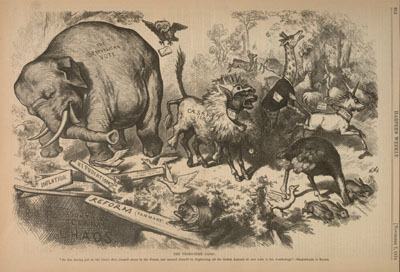Am I a bad mom? Sometimes I worry that in an effort to bring up children that are progressive, tolerant, self-aware, and self-reliant, and to make sure that they become “contributing members of a civil society” in the future, I may have pulled a cloud over their childhood. If they are fortunate enough to not to know about “the world out there”, who am I to ruin their parade by telling them the “truth”?
So my 10-year-old had to do a research report on this presidential election. One of the projects was to interview a democrat and a republican, ask them this one question: “What do you think a Democrat (or Republican) believes?” I felt bad for putting our loved ones on the spot: voting is a private matter, in my opinion, and sometimes the true reason someone votes for this party vs. the other is for that person’s conscience to know, and their conscience only. The people we ended up interviewing over the phone, surprisingly or maybe not so much, gave similar answers with regarding to almost everything: such as “A democrat/Republican believes that the middle class should receive tax reliefs.”
The differences we learned from our friends and families are, based on their own subjective opinions of course, “A Republican believes in a smaller government, whereas a Democrat believes in more taxes,” and “A Democrat believes in equality in all people and the responsibilities of the government to come to its people’s aid when they are in need.”
What strikes me the most was the fact that women from both parties see “Roe vs. Wade” as the main dividing line that separates Republicans from Democrats: one mentioned that Republicans believe in the “Right to live”, the other, Democrats believe in “Roe vs. Wade”. My son, being 10 years old, naturally had no idea what they were talking about, and our friends and families, bless their heart, naturally did not want to go into details.
.
So, how do you explain Roe vs. Wade to a 10-year-old boy?
.
This was why I woke up with self-doubt for my ability to be a good mother this morning: I actually gave it a try last night by giving him a general description of what Roe vs. Wade was about. How successful, I am not sure. My son understandably was disturbed by the concept of abortion, which I didn’t go into too much detail of course. He does not even know how women become pregnant yet, oh my goodness… {{surge of more self-doubt}}
At one point, I could see in his face his regret for supporting the Democratic Party (i.e. Obama in this election: he thinks Obama is the man, and the democrats will bring equality to the society, without me or my husband steering him either way… in fact we were quite puzzled by his interest in this election since we didn’t talk about politics in front of the kids until he himself showed interest in the topic… ) And I was upset with the teacher’s naivete in giving them the homework assignment: how does one talk about this presidential election, I mean, really talk about it, without getting into a discussion on the two sides over the “Roe vs. Wade” issue? How am I supposed to explain to my 5th grader, who despite his uncanny maturity still hugs stuffed animals at night?
I know a lot of people would argue that this is the reason why there shouldn’t be abortion allowed, period, if you don’t know how to explain such a procedure to a child. This way you don’t even need to explain it. To me, this is the reason why the issue of abortion should not be made to hijack the public political debate. It is a personal choice, and yes, I believe that women should have the right to choose. It is ironic to me that Republicans, for all their push for a smaller government, desperately want to extend their control over private matters such as gay marriage and this, and leave public health care issues to strictly between “patients and their care providers”…
